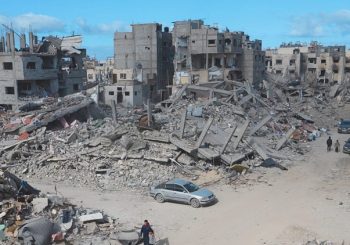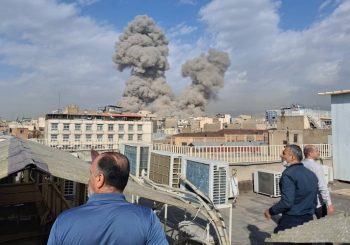U.S. Secretary of State Antony J. Blinken arrived in Tel Aviv on Sunday, 18 August, hoping to broker a ceasefire in Gaza, which has endured relentless Israeli shelling for the past 10 months in a grueling conflict.
However, mere hours after his arrival, Hamas, the militant group that controls much of the enclave, accused Israel of sabotaging the ceasefire talks.
Blinken, during his ninth visit to the Middle East since the outbreak of war in October, described the current moment as “probably the best, maybe the last opportunity” to secure both a ceasefire and a hostage release deal in Gaza. His remarks came on Monday, 19 August, during a meeting with Israeli President Isaac Herzog.
The U.S. has voiced cautious optimism following the resumption of talks in Doha last week. However, Hamas has dismissed reports of progress as an “illusion,” highlighting persistent disagreements, particularly regarding the future of Israeli troops in Gaza. Hamas remains adamant that any deal must include the complete withdrawal of Israeli forces, a condition that continues to be a major sticking point in the negotiations.
Hamas blamed Israeli Prime Minister Benjamin Netanyahu for “thwarting the mediators’ efforts,” accusing him of stalling negotiations and endangering Israeli hostages in Gaza by perpetuating the ongoing conflict.
Blinken is scheduled to meet with senior Israeli leaders, including Netanyahu, on Monday, according to a senior State Department official. Following his talks in Israel, Blinken will travel to Egypt.
Despite months of intermittent talks, mediated by Qatar, the United States, and Egypt, a ceasefire agreement remains elusive, with violence persisting in Gaza.
On Sunday, Israeli airstrikes claimed at least 21 lives in Gaza, according to Palestinian health authorities. Among the casualties were a mother and her six children, killed in an airstrike on their home in Deir al-Balah.
The Israeli military did not immediately respond to requests for comment, but has consistently denied targeting civilians, accusing Hamas of operating from civilian locations. In retaliation, Israel’s military reported the destruction of rocket launchers in Khan Younis and the killing of 20 Palestinian militants.
As the conflict intensifies, negotiations for a ceasefire are set to continue in Cairo this week, following preliminary discussions in Doha. Blinken is expected to push for a breakthrough after the U.S. introduced proposals aimed at bridging the divide between the warring sides.
The conflict, ignited on 7 October when a Hamas-led assault on Israel resulted in the deaths of over 40,000 Palestinians, according to local health authorities. Israel, which estimates that 17,000 Hamas fighters have been killed, has seen around 1,200 of its citizens perish and nearly 250 taken hostage.
With fears of a broader regional escalation growing, the urgency for a ceasefire has increased. Tensions escalated further following the assassination of Hamas leader Ismail Haniyeh in Tehran on July 31, prompting Iranian threats of retaliation against Israel.
Prime Minister Netanyahu remains steadfast in his demands for Israel’s security, emphasizing that ongoing negotiations are not a one-sided concession. “There are things we can be flexible on and… things that we cannot be flexible on,” Netanyahu stated during a cabinet meeting.
While Blinken strives to advance a deal that maximizes the release of Israeli hostages, Netanyahu’s office affirmed that any agreement must also meet Israel’s war objectives, including ensuring that Hamas does not retain control over Gaza. Meanwhile, Hamas dismissed optimistic U.S. statements as “deceptive,” accusing Netanyahu of introducing new conditions to derail the negotiations.
Central to the discord are disagreements over the future of Israeli troops in Gaza, particularly their presence along the Egyptian border, and security checks for people moving within the territory—measures Israel deems essential to preventing armed militants from re-entering the conflict zone.







Comments (0)